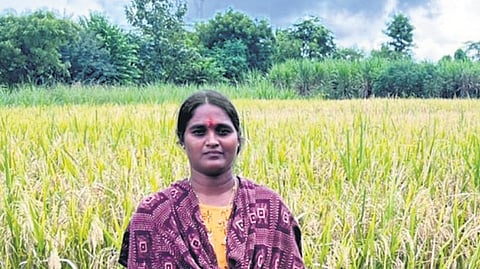

CHITTOOR : Natural farming under the Andhra Pradesh Community Managed Natural Farming (APCNF) initiative of1 Rythu Sadhikara Samstha is proving effective in boosting climate resilience and improving soil health. In Chittoor’s Mangunta village, farmer-scientist S Jhansi’s paddy field has exemplified the benefits of natural farming, demonstrating improved water infiltration and minimal waterlogging during recent heavy rains.
Intense rainfall from October 5 to 20 provided the scope for a clear comparison between natural and chemical farming. The ‘Kujupatali’ variety crop in Jhansi’s paddy field, showed resilience, with looser, more porous soil structure preventing water accumulation and crop damage. In contrast, nearby chemical farming fields experienced compacted soil and severe waterlogging, posing crop loss risk.
Dr K Pushpa, Thematic Point Person for Research and Learning at APCNF, highlighted that natural farming enhances soil health by boosting organic matter and microbial activity, improving structure, water retention, and infiltration. District Point Person B Divya supports Jhansi in her natural farming efforts.
Jhansi, supported by her husband, Samireddy Seshadri Reddy, grows paddy on one acre and sugarcane on two acres.The two crops withstood heavy rains without any damage. She said no pests or diseases affected her crops, attributing it to crop protection to organic inputs like Ghana and Drava Jeevamrutham.
A member of the Indo-German Global Academy for Agroecology Research and Learning (IGGAARL), Jhansi shared that the Farmer Scientist Course deepened her understanding of natural farming science. She emphasised that these practices are essential for regions facing heavy rainfall, as enhanced soil structure helps in water management and soil conservation, potentially reducing crop loss in extreme weather.
Jhansi’s paddy crop not only demonstrates the advantages of natural farming but also advocates for broader adoption of sustainable agriculture in Andhra Pradesh.